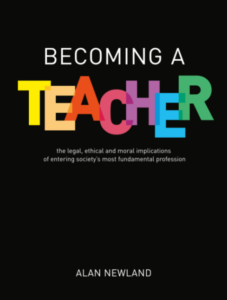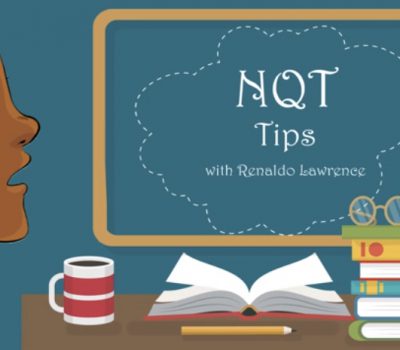


Our team sorts through all blog submissions to place them in the categories they fit the most - meaning it's never been simpler to gain advice and new knowledge for topics most important for you. This is why we have created this straight-forward guide to help you navigate our system.


And there you have it! Now your collection of blogs are catered to your chosen topics and are ready for you to explore. Plus, if you frequently return to the same categories you can bookmark your current URL and we will save your choices on return. Happy Reading!
Do you know what they are?
Some early career teachers or even teachers with more experience don’t always know the powers given to them by law.
Alan Newland sets the record straight and explains a variety of legal issues for teachers.

Did you know that teachers, even early career teachers still piloting their way through the tricky waters of their first few terms, have not only legal responsibilities but they have significant authorities and powers given to them by law too?
Most people know that teachers have legal responsibilities – though few know exactly what they are or how they work in practice. Most teachers don’t know what the exact nature of the authorities and powers they have or how to exercise them – and yet knowledge of these authorities and powers can give them enormous confidence to perform their jobs effectively.
Even experienced teachers don’t always know them either. Recently I received an email from a SCITT director who had just shown my video-lecture on ‘The Teacher and the Law’ to her large cohort of secondary trainees. It read:
Morning Alan. I hope all is well. All our trainees have now watched and engaged with your video. I have attached the feedback and as you can see it is very positive and I must admit, having been a teacher myself for eighteen years, I learnt some things from the video when I watched it too! Thank you for the time you have spent in putting together such an informative video for our trainees on a topic which is very important for inexperienced teachers to get right.
There’s no room for all the trainee feedback here but in virtually every comment – and there’s over seventy of them – they mention that the ‘stand-out’ information they got from watching the video was ‘reassurance’ about the clarity of the information on legal authorities and powers teachers have.
For example, many comments included surprise, even incredulity that teachers are allowed and expected to restrain children, not just for fighting, but for a variety of other reasons too.
Not only that, some had previously believed they were not even allowed to touch children.
They were astonished they had powers to impose a wide variety of disciplinary measures…
even for things that happened outside of school time… and amazed that they could be delegated to search a child who might be suspected of theft or concealing a weapon… they didn’t know they could confiscate a pupil’s property… it was a revelation to them that teachers could impose detentions without parental consent… and at weekends too!
But it came as a ‘reassuring’ and ‘confidence-building’ surprise that teachers are expected – by law – to behave ‘in loco parentis’ – as if they were ‘responsible parents’ – and that this legal authority goes back over a hundred and fifty years in English law.
Even where some trainees said they were not parents themselves, they understood what a ‘responsible parent’ does and does not do. One wrote: ‘It has been very useful and inspiring. I learnt so much from it. Alan’s talk made me feel confident that I can apply the principles of “loco parentis” and to trust my moral compass, while being aware of my accountability.’
I always advise trainees to follow their school policies however, even if those policies don’t go as far as the law allows. But it’s important that all teachers – both new and experienced – know what the law says and they don’t feel their confidence around children being drained or hamstrung by school policies that appear restrictive or too cautious.
The law is clear – it gives us both the responsibilities and the powers and authorities to do our jobs the way we need to.
If you were surprised by some things you’ve just read, then watch this short extract of: ‘The Teacher and the Law’ here. You might learn something very surprising!
Alan’s new book: ‘Becoming a teacher – the legal, ethical and moral implications of entering society’s most fundamental profession’ is out now, from Crown House Publishing.


The author

Read more

Read more

Read more

Read more

Read more

Read more

Read more

Read more


Are you looking for solutions? Let us help fund them! Nexus Education is a community of over 11,000 schools that come together to share best practise, ideas and CPD via online channels and free to attend events. Nexus also offers funding to all school groups in the UK via nexus-education.com


Established in 2011, One Education is a company at the heart of the education world, supporting over 600 schools and academies. Our unique appeal as a provider is in the breadth and synergy of the services we offer, supporting school leaders, teachers and support staff to achieve the best possible outcomes for their pupils and staff.

School Space is a social enterprise that has empowered schools for over 12 years through their profitable and hassle-free lettings services. So far, they’ve generated over £5 million in revenue for education, helping to connect over 200 schools with their local communities.


Unify is an online sales and marketing tool that allows users to create tailored personalised documents in moments.


There’s nothing special about the energy we sell. In fact, it’s exactly the same energy as all our competitors provide. But there is something special about the way we do it. Where others complicate the process, we simplify it. Where others confuse customers with hidden terms, we’re an open book. And where others do all they can to make as much money from their customers as possible, we do all we can to make as little. Everything we do, we do it differently. Our customers are a privilege. One we’ll never take advantage of.


Securus provide market-leading monitoring solutions to safeguard students on ALL devices both online and offline. We also offer a full monitoring service, where we carry out the monitoring on behalf of the school, freeing up valuable staff resources. From the smallest school to large MAT groups, Securus offers safeguarding protection for all!


Bodet Time offers dedicated solutions to education through lockdown alerts, class change systems, PA and synchronised clock systems. Improving time efficiency of the working and school day; ensuring safety through lockdown alerts; increasing communication with customised broadcast alerts.


Robotical makes Marty the Robot - a walking, dancing coding robot that makes programming fun and engaging for learners as young as 5. Our robots come with a full Learning Platform that has complete teaching resources, to make lesson planning a breeze.